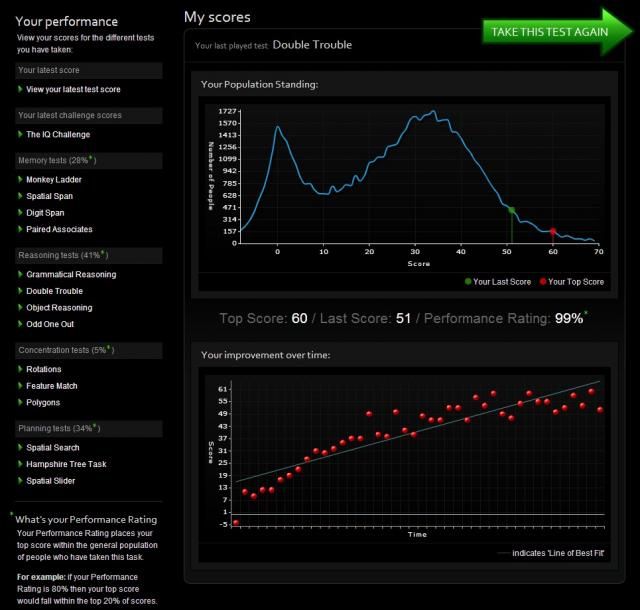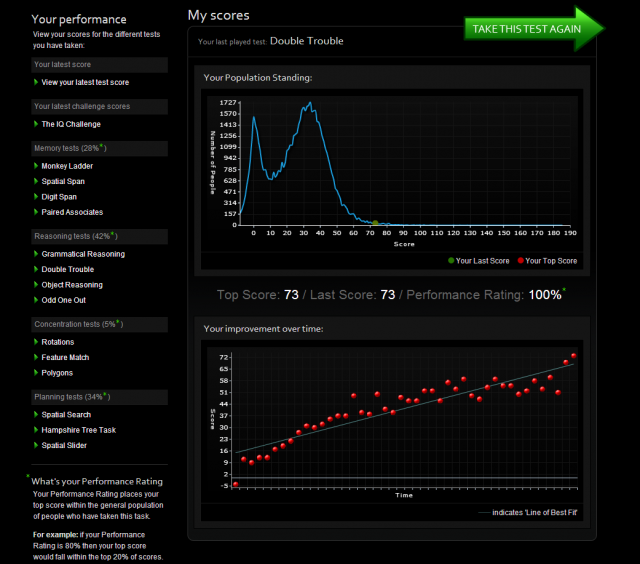UPDATE on Intuniv: If you start noticing the development of depressive mood patterns (not just being depressed all the time, but abnormal psychological signs, such as a paradoxically depressed reaction to a positive or neutral event), it's possible the Intuniv might be inducing them. Most meds affecting neurotransmitters have the potential to cause depression (as it seems depression manifests as a sign of abnormal brain function, not just any one neurotransmitter being too low or high), but adrenergic medications seem to have a greater tendency to induce it then other medications. Strattera (Atomoxetine) is an example of an adrenergic ADHD med well known to often cause depression, especially if the dose is too high. It seems Intuniv is less likely than Strattera to cause depression (being specifically an alpha-2 adrenal receptor agonist, rather than a reuptake inhibitor for norepinephrine like Strattera, which increases activity at all adrenal receptor sites), but there's still the possibility.
So if you noticed increased frequency of depressive episodes (or chronic mild depression that was not present before starting Intuniv), perhaps taper off the dosage, and see if taking a break gets rid of the depressive symptoms.
I have the same issues as your first post, so I am closely following this as well.
I seem to have issues with comprehension. I am a true fan of learning on my own and applying my own common knowledge to such tasks, but when it comes to reading out of a textbook and putting ideas together to form a discussion - I find it difficult.
And I've also seen a video where this female told her boyfriend to take adderall because he was unable to focus, and also couldn't see the body language and hints that she was showing him. After taking Adderall, he was shocked that he was now able to read these 'hints' and messages that she was showing him. I have trouble with this as well. I would hang out with a girl, and explain the issue later to my friends, only to know that she showed me 100 signs that she wanted me emotionally and sexually.
So I have a hard time focusing on a task, motivational issues, and reading body language and comprehending it.
I have many noots, due to the supplier on Amazon who had sent me a sample pack -- and then again, when I said I didn't receive it. So they had treated me extra well. I do have Phenylpiracetam, but none of the others. It seemed to work when I had taken it first, but not anymore. And thinking about it, I can almost taste the bitterness of it (even though I hadn't taken it for two weeks).
So I think I am going to try Oxiracetam for studying, and Aniracetam both alone and together.
I've seen multiple posts about Aniracetam being good for writing, and talking to new people and getting shit down. Oxiracetam being a pure focus tam, but not good for flexible thinking. I guess I will start there.
I would definitely enjoy hearing the opinion of the OP about my stack above.
I take 8 fish oil capsules -- 2 capsules have 720mg of omega-3, so it is around 2880 a day in omega-3. And now I take magnesium, 300mg a day. Vitamin D is also essential (just as magnesium) so I will be taking that shortly.
I really want a stack for studying because I really do have trouble. In middle school, I would go to a woman who would test me for reading comprehension. I can read perfectly - perfect pronunciation, and perfect speed. I was the best in my class. Also, I am perfect for writing with knowledge I have acquired through doing. College is reading, not doing something. In high school, she proved that I had a hard time concentrating, and remembering what I read. I looked it up today, and reading comprehension issues said people have issues remembering what they read, get confused after reading several pages, find it difficult to explain things (omg yes), answers the wrong questions, difficulty maintaining relationships because they don't understand or communicate well, and feel frequently frustrated that they can't 'break through' no matter how many things they've tried.
This happens with me a lot. I also feel frustrated with my dumb car, no matter how many things I tried. For instance, this stupid clip had me swearing and all haha.
So I definitely think my issue is comprehension. There was this guy I was trying to explain a situation to, and he mentioned reading comprehension issue as well. He was completely rude and failed to understand what I was telling him. I knew he said that just to win this argument we had, but now I am really thinking that I do have issues comprehending my thoughts and what I read.
It sucks because I do fail at realizing body language and these hints these women throw at me. :-/ and personal relationships are something I REALLY strive to maintain.
http://www.understan...om/i-adults.htm
I think noots definitely have the ability to help cases like yours. In terms of studying nootropics, I tend to disagree with the idea that the various racetams each have their own very specific effects that people often ascribe too them. I think some might help certain general areas of cognition more than others, but I'm very skeptical of claims that one is good for reading, and one is good for writing, etc. Most cognitive tasks involve pretty much all of the brain's systems, for example, we now know that language is nowhere near as localized in the brain as we previously thought, but that it involves pretty much all regions of the brain. We've also found that the brain seems to encode memories pretty much everywhere instead of just one specific spot. Most of the claims about certain racetams causing very specific effects probably originated from a couple of users erroneously ascribing a coincidentally good day of writing too the nootropic, and then the placebo effect perpetuates it for a few days. I can guarantee you won't see any actual studies noting such specific effects.
In regards to some of the racetams you mentioned, I would not bother with aniracetam. It has a ridiculously short half-life, you'd need to dose it pretty much every hour you wanted to feel it's effects. It's also not water soluble, which means every time you dose it, you'll need to eat or drink something fatty with it for optimal absorption. If you like the sound of it's effects, there are other AMPAkines that are much more practical (Nefiracetam or Sunifiram are good options).
I liked Oxiracetam most out of all the racetams, it's definitely one I'd take daily. It was just the right amount of "stimulation" (not Ritalin like stimulation, but increased awareness, memory retention, clearer thought streams, etc), but it wasn't excessive like other racetams. Note that in my experience the effects of racetams follow an inverse-U shaped curve of performance. They all have effects after a certain dosage is surpassed, but those effects are not always positive. It's like they put your brain in overdrive; a little bit squeezes a bit more performance out of your brain, but excessive stimulation starts causing errors and other dysfunctions (i.e mood instability). Some racetams I found to simply be too strong at their functional doses, others didn't do much. Oxiracetam sat comfortably in the area that I felt just a little bit of a boost, but without side-effects. I wouldn't limit your use of it to just studying, it's definitely a very good all-around nootropic. As always though, start with a low dose, and work your way up until you reach that sweet spot where your performance increases, but no side-effects appear.
As for the fish oil, you can probably cut your doses to 2 grams a day (that numbers for the weight of the fish oil itself, not the concentration of fatty acids) for most cognitive goals. Most of the studies for fish oil's effect on brain health in healthy people (so excluding those who are deficient, elderly or are trying to treat some sort of disorder), used between 1-2 grams. That's assuming it's quality fish oil of course, if it has lower concentrations of EPA and DHA than most, a higher dose is prudent.
I can't agree more with your decision to supplement magnesium, I'm constantly recommending it to people. A few studies have calculated that a very large portion of Americans have clinical magnesium deficiency (their serum levels are below the recommended range. Not all of them are necessarily pathological or have any symptoms at all, but it definitely doesn't hurt to keep your magnesium levels optimal). Slightly reduced levels of magnesium can affect the brain in very subtle ways, whereas levels need to drop signifigantly to produce pronounced systemic symptoms. A slight deficiency can contribute to anxiety disorders, produce general nervousness, fatigue, difficulty concentrating, cause mild tremors or cramps, etc. So definitely a good idea to take a daily supplement (although the study examined Americans, it's results likely extend to Canada and any other country with a diet similar to Americans). Just don't overdo it, like most metals, taking excessive amounts of one can disrupt the absorption of others, so stick to the recommended dose for the form you take (it differs between Magnesium Citrate, Gluconate, L-Threonate, etc, so look it up for whichever type you choose). Vitamin D is also something good to take regularly, though less so than magnesium. Making sure you have adequate levels will reduce the risk of some cancers (particularly colon cancer), and supplementing it might be ideal for those with Seasonal Affective Disorders (mood disorders which have been found to definitively correlate with winter, and hence possibly reduced Vitamin D levels).
For your social issues, you'll probably find that the racetams don't help a whole lot. You'll see some individual case reports of seemingly remarkable improvements in those with such issues, but there haven't been any studies noting such effects in those trying the racetams, so it seems unlikely. What's more likely to help those conditions is either an adrenergic agent (Strattera, Intuniv, etc) or a dopaminergic agent (i.e Adderall or Ritalin). Adrenergic agents seem to directly affect concentration (usually increasing one's ability to focus, as well as the duration one can focus) amongst other things, whereas dopaminergic agents seem to induce exploratory behavior (i.e socializing, work initiation, etc), as well as produce some improvements in working memory related tasks (though this portion of their effects tends to follow an inverse-U shaped performance curve; too much potency and/or too high of a dose can cause decreased working memory performance, and I can back this up from experience). Note that neurotransmitter systems tend to indirectly affect others, hence why some people find Strattera improves their ability to socialize, or Ritalin reduces their hyperactivity (hint: it has downstream adrenergic activity, so it helps that symptom in the same way Intuniv does).
I would advise trying Ritalin for your social issues. Don't start with one of the time release ones, as they can be a bit finnicky and inconsistent, so I wouldn't judge the performance of methylphenidate based on them. Also start low. I found higher doses certainly feel good, but they don't help me, and even adversely affect me (i.e making me focus too much, to the point I would forget other things easily). A dosage of 10 mg to start should be fine if you have an average body weight. If you're in the upper end of things, 20 mgs would be the highest I'd go to start. Be cautious if the doctor prescribes amounts greater than 40 mg daily (they frequently will, but that's higher than needed and will probably produce lots of side-effects, tolerance, and addiction).


















































